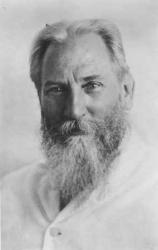|
Short Name: |
Charles Webster Leadbeater |
|
Full Name: |
Leadbeater, Charles Webster, 1847-1934 |
|
Birth Year: |
1847 |
|
Death Year: |
1934 |
Charles Webster Leadbeater was born in Stockport, Cheshire, England in 1854. When he was eight years old, his father died; four years later the bank where the family had invested their savings went bankrupt. Because there were not funds for him to attend college, Leadbeater worked at clerical jobs and was self-educated. An uncle encouraged him to become an Anglican priest and Leadbeater was ordained in 1879. As a young child growing up in a time of materialist thinking, he was convinced that God was good and that death was not the end of life. He did not believe in hell. He became interested in contacting the dead to prove that death was not the end. This led him into an interest in spiritualism, the occult, and Theosophy - a movement to transmit an ancient "universal religion," or the essential truth underlying religion, philosophy and science. In 1915, Leadbeater moved to Sydney, Australia where he became acquainted with J. I. Wedgewood, and Theosophist and bishop in the Liberal Catholic Church, and in 1916 Leadbeater was also consecrated as a bishop of the Liberal Catholic Church. He was largely responsible for The St. Alban Hymnal published in 1921 by St. Alban Press.
Dianne Shapiro, from Wikipedia, "How Theosophy Came To Me" by C. W. Leadbeater (accessed at http://www.singaporelodge.org/htctm.htm 2-10-2019) and Wikipedia article on Theosophy
Charles Webster Leadbeater (/ˈlɛdˌbɛtər/; 16 February 1854 – 1 March 1934) was a member of the Theosophical Society, Co-Freemasonry, author on occult subjects and co-initiator with J. I. Wedgwood of the Liberal Catholic Church.
Wikipedia Biography


 My Starred Hymns
My Starred Hymns



